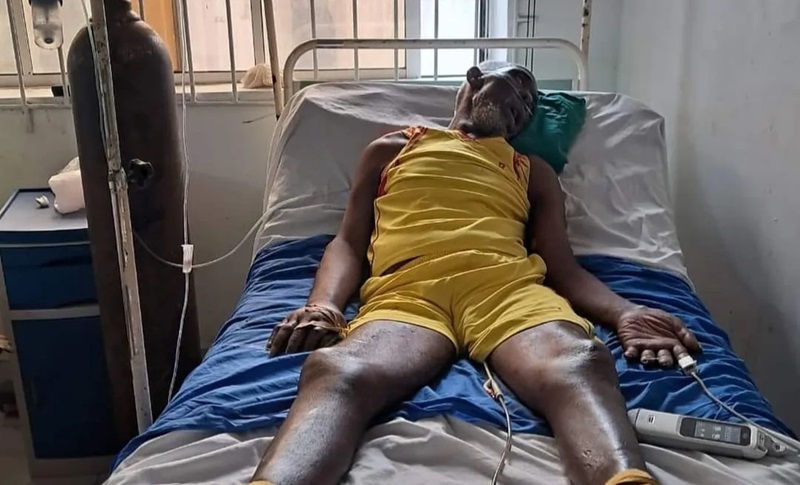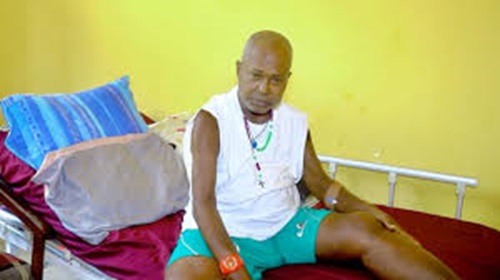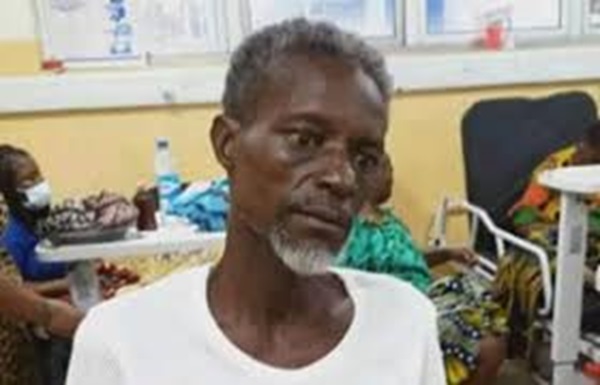October 14, (THEWILL) – In a quiet hospital room in Sapele, Delta State, Peter Fregene, once Nigeria’s formidable goalkeeper, lies critically ill. The man who guarded Nigeria’s goal across three decades – the 1960s, 1970s and 1980s – now depends on the generosity of strangers for his survival. This distressing scene, brought to light by former Green Eagles captain, Segun Odegbami, has reignited a long-standing debate about the welfare of Nigeria’s retired football stars.
Fregene’s plight is a harrowing reminder of the stark reality facing many of Nigeria’s former football stars. Once celebrated as national heroes, these ex-players now struggle with illness, poverty and neglect in their twilight years. The lack of support from government and football authorities has left these retired athletes in dire straits, forcing them to rely on the kindness of private individuals and organisations for their basic needs.
The gravity of Fregene’s situation became apparent when Odegbami shared a distressing photo of the former goalkeeper on his hospital bed. The image sparked an outpouring of concern and support from Nigerians worldwide. Within days, three anonymous donors stepped forward to assist with Fregene’s medical expenses, enabling his transfer to the Delta State Teaching Hospital in Oghara for more comprehensive care.
While this surge of goodwill offers hope for Fregene, it also highlights a systemic failure in Nigerian football. The need for public appeals and private philanthropy to save the lives of national heroes points to a glaring absence of institutional support for retired players.
Odegbami, in his impassioned plea for Fregene, expressed frustration at having to repeatedly seek help from the same group of philanthropists. He named businessmen Femi Otedola and Mike Adenuga, along with politicians Babajide Sanwo-Olu and Babatunde Fashola, as frequent responders to such crises. The reliance on these individuals, while commendable, underscores the lack of a structured welfare system for retired athletes.
Fregene’s case, unfortunately, is not an isolated incident. In recent years, several former Nigerian football stars have faced similar hardships. Henry Nwosu, the youngest member of Nigeria’s 1980 Africa Cup of Nations winning team, suffered a stroke and required financial assistance for treatment. Emmanuel Emenike, a former Super Eagles forward, shared a video of himself in a hospital bed, drawing attention to his health struggles. Emmanuel Ebiede, another ex-Super Eagles player, was hospitalised with Hepatitis B in Port Harcourt.
The list of suffering ex-players grows longer. Yisa Sofoluwe, nicknamed the Super Eagles “Defense Minister,” tragically died from cerebral atrophy. Wilson Oruma, a former Nigerian midfielder, faced severe mental health challenges after falling victim to fraud, losing a substantial amount of money and barely got by even if he has confirmed that he is stable and currently doing better.
These cases paint a grim picture of life after football for many Nigerian players. They raise pressing questions about the value placed on these athletes who once brought glory to the nation. How can a country that celebrates its football victories so passionately abandon its heroes in their time of need?
The absence of government support and the reliance on individual benefactors highlight the urgent need for a structured welfare system. Odegbami, voicing the frustration felt by many, questions why Nigeria still lacks a simple welfare scheme for active and retired athletes across all sports, 64 years after independence.
This neglect not only affects the retired players but also casts a long shadow over the future of Nigerian football. Current and aspiring footballers witness the struggles of their predecessors, potentially discouraging them from pursuing patriotic ideals or representing their country with everything they have. The situation creates an atmosphere of distrust and undermines the passion and commitment needed for success in international competitions.
Moreover, the neglect of retired footballers tarnishes Nigeria’s reputation on the global stage. It sends a message that the country does not value its sports heroes, which could affect relationships with international football bodies and potentially impact future opportunities for Nigerian players.
To address this issue, several steps can be taken. The government, in collaboration with the Nigeria Football Federation (NFF), should create a dedicated fund to support retired athletes. This National Sports Welfare Fund could be financed through a combination of government allocations, contributions from active players, and a percentage of revenue from national team matches and sponsorships.
A comprehensive health insurance scheme specifically for retired national team players would ensure they have access to quality medical care throughout their lives. This could be complemented by a pension system for retired footballers who have represented the country at the international level, providing them with a steady income in their post-playing years.
Beyond financial support, retired players need opportunities to remain engaged with the sport. Skills development and employment programmes could offer them education, training, and employment within the sports sector, enabling them to stay connected to the game and earn a living after their playing careers end.
Regular health check-ups for retired players could help detect and address health issues early, preventing situations like Fregene’s from escalating. Additionally, a formal system to recognise and honour retired players would keep them in the public eye and potentially open up opportunities for them.
Crucially, any welfare programmes implemented must be managed transparently, with regular audits and public reporting to prevent mismanagement of funds. This transparency would build trust and ensure that the support reaches those who need it most.
The implementation of these measures would not only provide much-needed support to retired footballers but also send a powerful message to current and future players. It would show that representing Nigeria is not just about the glory on the field but also about long-term security and respect.
Public support is vital in pushing for these changes. Fans, journalists, and sports enthusiasts must continue to raise awareness about the plight of retired footballers and pressure the government and football authorities to take action. Social media campaigns, petitions, and public demonstrations can help keep this issue in the spotlight and demand accountability from those in power.
The private sector also has a significant role to play. Companies involved in sports sponsorship could allocate a portion of their budgets to support retired athletes. This could be done through direct financial assistance, job opportunities, or funding for healthcare and education programs.
International football bodies like FIFA and CAF (Confederation of African Football) should also be engaged to support and potentially mandate welfare programmes for retired players in member countries. Their influence and resources could be instrumental in creating sustainable solutions across the continent and beyond.
The situation of Nigeria’s retired footballers is a national embarrassment that requires immediate attention. These athletes, who once brought joy and pride to millions of Nigerians, deserve better than to be forgotten and left to suffer in their twilight years. By taking care of its sports heroes, Nigeria can restore faith in its football system, inspire the next generation of players, and uphold its reputation as a nation that values its athletes.
The government, football authorities, private sector, and the public must come together to create a comprehensive support system for retired footballers. Only then can Nigeria truly claim to be a football-loving nation that respects and cares for those who have given their all for the country’s glory on the international stage.
Fregene’s case should serve as a wake-up call. Every day that passes without a solution puts more retired players at risk of falling into poverty and ill health. The nation owes it to these forgotten heroes to act swiftly and decisively, ensuring that their contributions to Nigerian football are honoured not just in words, but in tangible support that allows them to live out their retirement years with dignity and security. The ball is now in our court. It is time for Nigeria to score a goal for its football heroes.
Jude Obafemi is a versatile senior Correspondent at THEWILL Newspapers, excelling in sourcing, researching, and delivering sports news stories for both print and digital publications.







